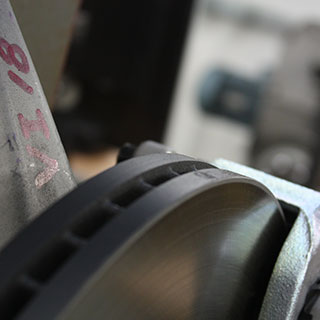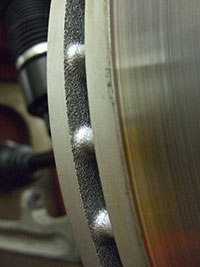
Braking course
Braking of Road Vehicles
Short course at the University of Bradford
This well-established course provides a comprehensive overview of the discipline, starting from the fundamentals of brakes and braking systems for car and commercial vehicle applications.
Content is updated annually to meet the current needs of the braking industry, and the subject matter is treated from both theoretical and practical standpoints.
You will learn from expert practitioners and network with fellow professionals. Course delivery is designed to facilitate discussion and interchange of experience and ideas between attendees and course leaders.
Next course dates
2 - 6 September 2024 (Bradford, UK)
Please contact us for full details.
Cost
£2000 per delegate
Who should attend?
The course is designed for engineering, technical and professional staff in the industry who would benefit from a period of concentrated study in this important branch of automotive engineering. The course is broad enough in concept to benefit vehicle engineers generally, as well as those with specialist brake interests.
A degree, technical diploma, HND or HNC, or some professional qualification and practical experience is desirable, though not essential.
Continuing Education Certificates of Attendance will be issued to participants which count towards individual CPD records.
Delegates will be offered the opportunity to undertake a course assessment which, if successful, will result in academic credit which may subsequently be used to count towards a higher degree.
Why attend?
Each delegate receives a book of the course notes which is convenient and up-to-date for ease of reference, and a Certificate of Continuing Education from the University of Bradford. This can be used as evidence of CPD for professional purposes, and even contribute towards a Higher Degree if the delegate wishes to gain further academic qualifications.
Employers benefit from increased knowledge and understanding in the field of braking, in particular a broader understanding, e.g. friction materials for vehicle designers, legislation for materials suppliers, or basic theory and science for researchers.
The course also offers opportunities to discuss particular issues with the lecturers, which can offer valuable insight into the way other braking specialists have dealt in the past with similar concerns. There are opportunities to ask questions and talk to academic staff working in a range of related fields. The broad range of companies and organisations represented each year at the course (usually over 30 different companies and organisations from all over the world) provides a first class networking environment.
Course content
- Friction and friction materials
- Brakes & braking system design & analysis
- The dynamics of braking & car braking distribution
- Commercial vehicle brake design
- Brake sizing
- Passenger car brake system layout
- Commercial vehicle Layout & braking distribution
- Friction pairs
- ABS & TCS
- EHB
- Passenger car ESC systems
- Thermal effects in brakes
- Legislation and Type Approval
- Regenerative braking & brake blending
- Materials design for disc brakes
- Brake noise, vibration and judder
- Brake testing
- Electronic braking – an aid to vehicle stability
- Case studies
Course overview

The course provides technical education in the subject area of brakes and braking systems for professionals in the Automotive Industry and associated organisations including OEM’s, suppliers, legislative organisations, government, police, and armed forces, in the U.K., Europe, and worldwide.
Every year the course is updated to incorporate new technological developments thereby ensuring that it continues to meet the needs of those individuals and organisations working in the field of automotive braking. The pace of technological development in brake mechanical design, materials science, friction and wear, systems modelling and performance prediction, mechatronic systems, software control systems, and overall automotive systems integration is rapid, and the course (and the course book) sets out to offer current understanding and future guidance to delegates and readers.
The course starts from the fundamentals of brakes and braking systems, and covers both car and commercial vehicle applications from both theoretical and practical standpoints. It is intended for engineering graduates and others of equivalent qualification who wish to study the specialist area of brakes and braking systems within the general field of automotive engineering. The topics are broad enough in context to interest vehicle engineers generally as well as those with specialist brake interests.
The Braking of Road Vehicles short course is organised and run by Dr David Bryant at the University of Bradford, with Dr Colin Ross (formerly KNORR-BREMSE Ltd.) and Ian Moore (Ford of Europe). The strength and unique character of the course come from the contributors, who are all expert practitioners in their own particular areas of braking.
The Faculty of Engineering & Digital Technologies at the University of Bradford offers a wide range of educational and professional study programmes in the areas of CAD and CAE, automotive engineering, vehicle dynamics using multi-body dynamics, and Engineering Statistics and Failure Mode Avoidance. Industry-focussed continuing education and continuing professional development are available through part-time and full-time Masters (MSc / MPhil) and PhD programmes.
The course team
Speakers
Where to find us
The Faculty of Engineering & Informatics
University of Bradford,
Richmond Road,
Bradford,
West Yorkshire,
BD7 1DP
